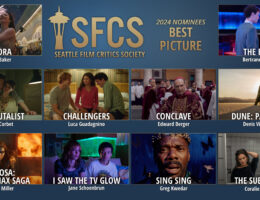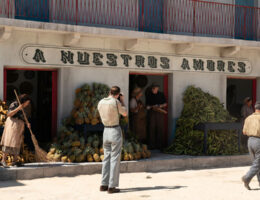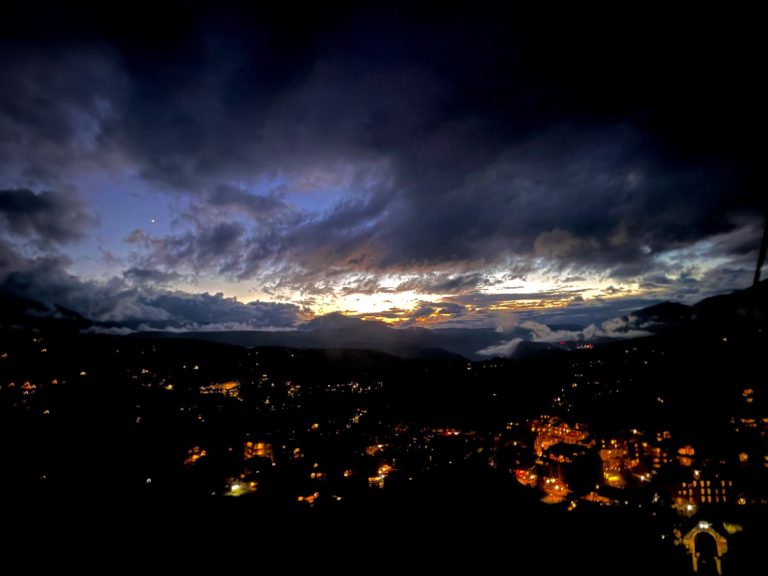With this year’s festival running an extra day, I’ve tried to embrace the “marathon not a sprint” mindset for my time in Telluride. Rather than spending all of my waking hours trying to squeeze in every possible movie, I’m taking a new-to-me approach of trying to carve out time for things like “not subsisting on popcorn and Rxbars”. To that end, Friday was a complete success. We punted on the afternoon block in favor of a fresh peach gimlet and fried green tomato sandwich in the backyard of the Butcher and the Baker. Later, walking back into town, a surprise open air concert in the town’s newish Warehouse arts space was too charming to resist; people spread out listening to music, kids scurrying around, twinkling stars above. Dropping in for a half hour meant missing the line for queues for a surprisingly full screening of Petite Maman. As consolation we grabbed a table near an open window at The National for a cocktail (I couldn’t resist the dare of one with Japanese whisky and nori) and ended up eating our way through their incredible menu when we learned that the kitchen was staying open late.
As nice as it was to have “non-film” experiences in this wonderful town, I was only willing to take a break because I’d already spent the rest of the day immersed in the very different worlds of three directors who reliably create worlds that I always enjoy visiting.
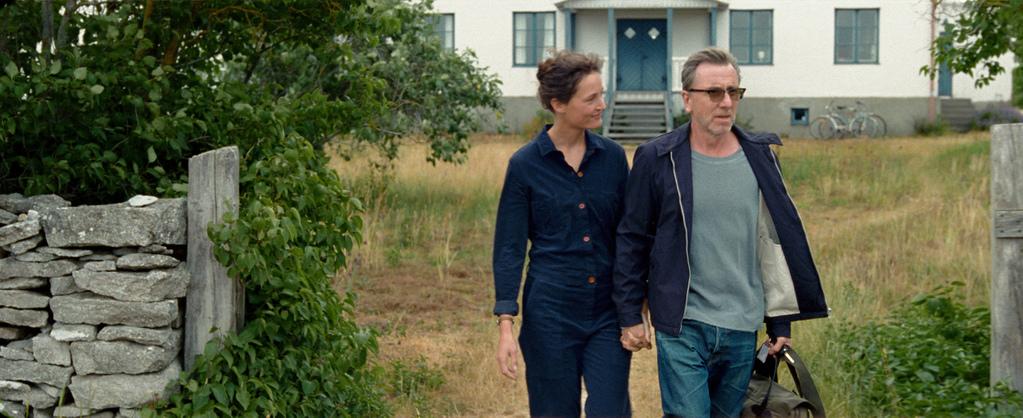
My first film of the day was a trip to the Swedish island of Fårö, courtesy of Mia Hansen-Løve’s Bergman Island. Working with a primarily english language script (a decision that she has explained as a necessary “doorway to fiction”), the story finds two married film directors (Chris and Tony) played by Vicky Krieps and Tim Roth on a pilgrimage to the cinephile destination where Ingmar Bergman conceived and shot many of his most revered films. Staying in one of his homes, they each set to work on their separate upcoming projects.
Hansen-Løve communicates the dimensions of their loving relationship, but vastly different styles and stations through the ways they experience the working retreat. He takes a spare bedroom and makes rapid progress on a script; she occupies an abandoned windmill guest room and struggles with whether her ideas are new, substantial, or worthy enough for a film. He’s the type of director who spends his time on the island appearing on panels and fending off hordes of adoring fans; she skips a “Bergman Safari” and crosses paths with a solitary student director who gives her a private tour of the island, complete with artisanal cider, a swim on the shore in shallow waters populated by harmless jellyfish, and a roadside shopping excursion for souvenir sheepskin blankets. The rustling of wind through the tall grasses and local wildlife make up the primary soundtrack as naturalistic portrait develops of the couple exploring the setting together and apart, discussing film with locals, and taking scenic bicycle rides during writing breaks.
Eventually, in a metafictional turn, Hansen-Løve allows her film to folds into something entirely different. As Chris begins to describe the outline for her emerging project to Tony, we watch her work-in-progress in the form of a romantic film-within-the film starring Mia Wasikowska and Anders Danielsen Lie. We can see the points of inspiration from Chris’s own life and her recent experiences in Fårö, but it also takes on a life of its own. As the meta-story unfolds, it becomes a commentary on the infinite cyclical interplay of art and life, both a compelling story in and of itself as well as an insightful exploration of the creative process, a perpetual theme of Hansen-Løve’s exceptional filmography. Even without all the art-within-art autofictional elements, this island getaway is an incredibly chill vibe and a place that I’d happily spend a summer.
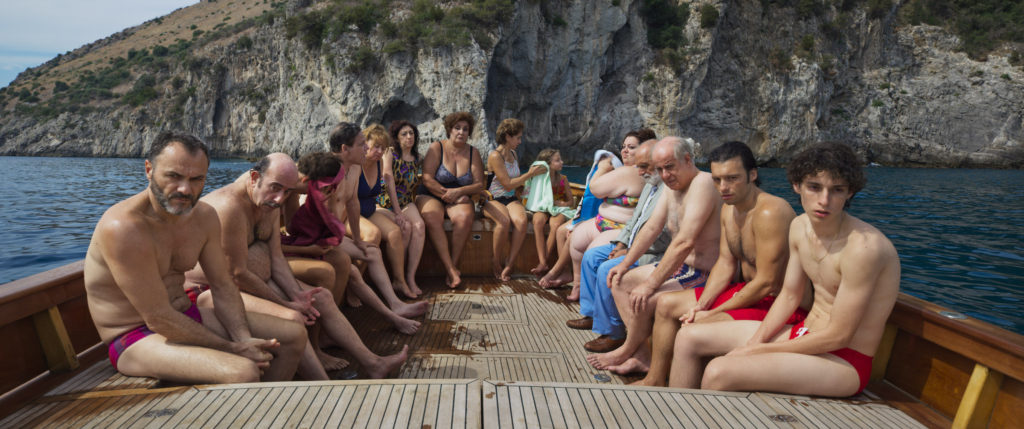
Second in what turned out to be a day of films set in Europe about the nature of creativity and storytelling, The Hand of God at first felt like a huge change of scale for Paolo Sorrentino, whose feverish work in Il Divo, The Young Pope, and The New Pope had utterly dazzled me. Here, in place of the recent operatics was a closely-observed family drama and ode to his cinematic influences, but on reflection, I suppose there is nothing bigger than the story of how you became who you are.
In his introductory remarks to the screening, Sorrentino likened his decision to tell the story of his adolescence as something like taking a trip to the dentist: painful but necessary. He takes us back to the bustling and messy Naples of his youth, casting Filippo Scotti (an Italian with strong Timothée Chalamet energy) as his lonely, soccer-obsessed teen avatar, Fabietto. He floats quietly through schooldays and family occasions with a walkman on his hip and headphones constantly around his neck. The always-charismatic Toni Servillo is his kindly banker father whose adoring relationship with his prankster mother makes for a sweet homelife. Rounded out by an idealized college-aged brother and perpetually-offscreen sister, his immediate middle-class household is an island of relative normalcy in comparison to a sprawling outlandish extended family.
Sorrentino is, as always, an exceptional collector of characters, an generous showman of faces, and an inclusive portraitist of a wide variety of imperfect bodies. The first half of the movie introduces us to all of these: the menacing matriarch who munches mozzarella in a corner, a perpetually-disappointed lawyer uncle, the impossibly attractive aunt who is the object of every unrelated male’s lust, and a robot-voiced suitor of an unmarried cousin whose baking hobby is a source of comedic relief. Regardless of their scams, stations, or occupations everyone in the city is united in their obsession with the possibility that the great Maradona will come to play football for their club.
Eventually, as the title suggests, he does and his presence on the team indirectly saves young Fabietto’s life. In the wake of this formative event, the second half becomes a study in grief and a cinematic notebook dump of the influences that would come to shape Sorrentino oeuvre. The grounded mood of the first half becomes ever-heightened as he, via Fabietto’s awakening, revisits the people, events, and happenings that pushed him to persevere into a career in filmmaking. Although it felt like the story could have concluded at multiple points, it is hard to complain about too many breathtaking images of the Italian countryside in the company of an up-and-coming young actor. It’s a treat to luxuriate in a stunning and deeply personal portrait of an artist on the cusp from a director at the height of his capabilities.
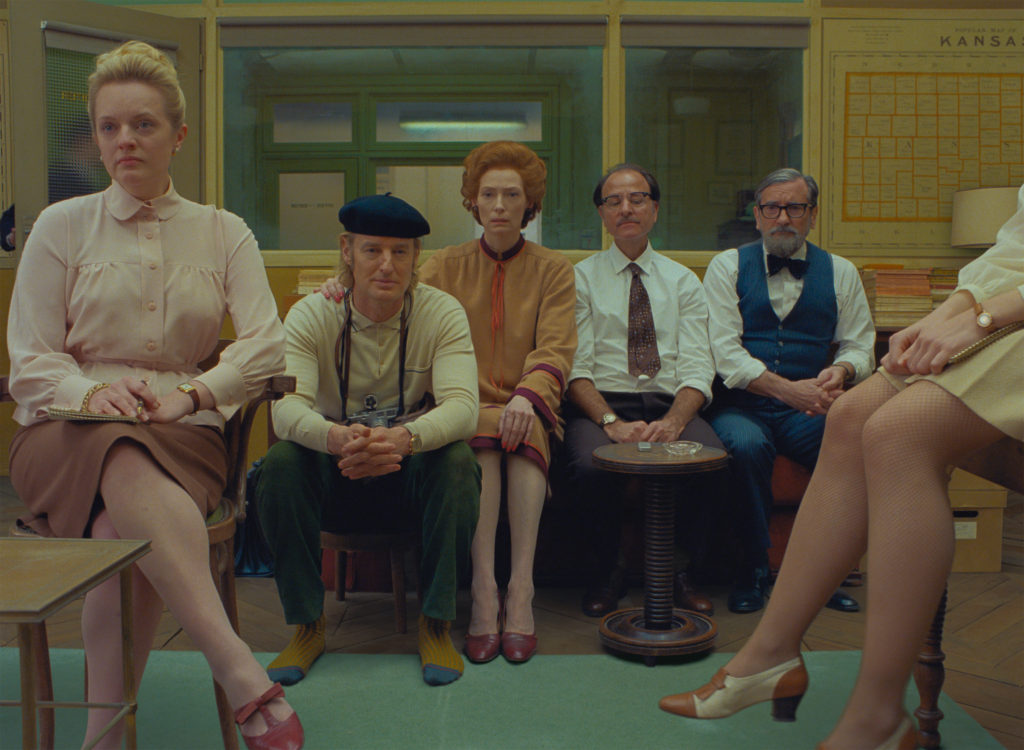
The French Dispatch wasn’t on the initial Telluride program announcement (even though it was on the list of selections from last year’s phantom festival); so it became the must-see screening when it was slotted into the TBAs as a “sneak preview”. The series of short stories are simultaneously adoring & skewering of the precious world of indulgent long-form journalism feel like Wes Anderson’s achievement of his purest form. At this point, you know whether this is a caution or a complement.
For me, the visit to the fictional town of Ennui-sur-Blasé via a corps of stuffy journalists on the occasion of the final issue of their magazine was an utter delight of eye candy and inventive storytelling. An obituary introduces the history of the publication and Owen Wilson provides an amuse bouche with a whimsical bicycle tour of the town’s seedy underbelly. The film then proceeds to recount three, New Yorker-ish parodies, in which intrepid reporters embed themselves in their work. The pieces are essentially three independent short films, each told with a kaleidoscopic array of formats that each proceed with distinct energies through their array of timelines, first-person storytelling, and dipping into veins of memory.
In the first segment, Tilda Swinton gives a retrospective lecture about an outsider artist that sprung from a bizarre prison love story between murderous Benicio del Toro and his muse/guard Lea Seydoux that’s riddled with a comedic sideplot steeped in art world speculation, manipulation, and bribery led by Adrien Brody. Next, Frances McDormand reports from a student uprising (credo, “the Children Are Grumpy”) fronted by Timotheé Chalamet (wild haired, ridiculously mustached, and embarrassed by his “new muscles”). Finally, in a technicolor television interview Jeffrey Wright recounts the tale of a highly esteemed police chef that parodies French food culture before veering into an animated kidnapping caper that comments on paternal devotion, loneliness, and the eternal outsider status of immigrants and expats.
Each chapter provides opportunities for all the handcrafted dioramas, symmetric cinematogrphay, clever use of text, and esteemed actors playing dress-up. It’s more than enough to satisfy any Wesophile’s wildest dreams, and is of course delivered in the service of melancholy stories, mostly of sad boys, that fully indulge decades worth of retro style. Maybe the substance never fully gels, but if this is your cup of espresso you’ll certainly never get bored. I liked the stories in approximate order of presentation, but perhaps that’s indicative of how they may have been better served as separate short films. Yet, when the cavalcade of twee whimsy loops back to the present, I found that the epilogue hit with unexpected poignance.

